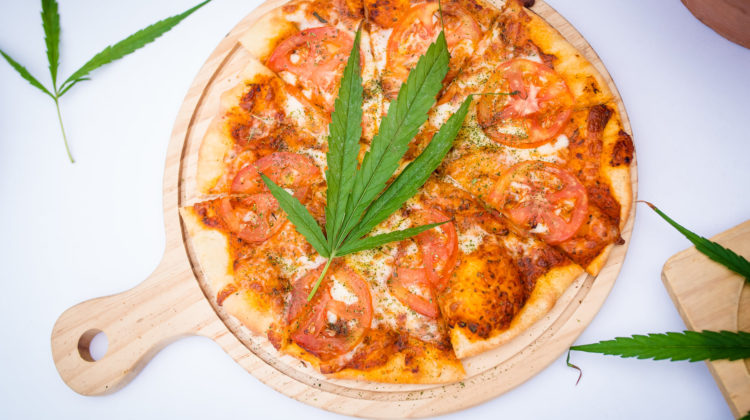
Cafe in Thailand using cannabis in pizza. Photo Credit: Chi Samui.
After becoming the first country in Asia to allow the use of medical cannabis in 2018, Thailand is now the first Southeast Asian country to effectively decriminalize cannabis.
Ever since 2018, the country has undergone reforms to ease its laws against cannabis. This progress had only accelerated since the 2019 election of Thailand’s current Health Minister, Anutin Charnvirakul whose campaign centered on cannabis legalization, according to Time.
This year, he announced plans to remove cannabis from the country’s Narcotics Control Board’s list of controlled drugs. That plan came to fruition on January 25th.
The action also makes it possible for Thai residents to grow medical cannabis at home. As Reuters reports, Charnvirakul says, “under the new rule, people can grow cannabis plants at home after notifying their local government […].”
According to the Associated Press, “the Health Ministry measure retains on its list of controlled drugs parts from the cannabis plant that contain more than 0.2% by weight of [THC], the psychoactive ingredient that gives users a high.”
Only a few months ago, growing home crops of cannabis was restricted to six pots of the plant as well as only being able to be sold to medical facilities, Bloomberg reported. The revision will remove this limit; it will also allow the public to freely grow it for their own use, such as for traditional remedies.
Traditional use of Cannabis
Many have traditionally used cannabis (or “ganja” in Thai) for a variety of things ranging from medicine to food.
Pongaraya Butchantha, a doctor from Chachoengsaoc, explained that cannabis is traditional in Thai medicine. In fact, he said “there are 16 medicines on the national registry that include marijuana as an ingredient.”
For example, dried or powdered cannabis is often added to soups or curries to prevent diabetes and high blood pressure. He also notes the importance of sleep. One type, deep sleep, maintains balance in the body and allows it to naturally recover, he explained. While people only receive this sleep in small amounts, cannabis can assist the body to undergo deep sleep.
People have also popularly used various parts of the plants like the roots, stem, stalks, and leaves in food. According to Atlas Obscura, many residents experienced cannabis in noodle soups. The cannabis plant contains glutamic acid. This draws out the flavor in food, and acts similarly to MSG in this respect. It sees use in drinks and even pizza.
For instance, one Thai pizza chain made headlines last year for their Crazy Happy Pizza. As the Associated Press reported, The Pizza Company released the pizza, which includes fried cannabis leaves, a cannabis-infused crust, and chopped cannabis in the dipping sauce.
Historically, the cannabis plant was also used as a source of fiber for clothes or other products like rope. This originated from some of the Hmong, a Chinese ethnic group, that had migrated to Thailand, according to a review by Robert C. Clarke and Wenfeng Gu in the National Drug Library. Hmong women would learn how to spin and weave hemp fibers by hand, though this tradition declined with the introduction of cotton and synthetic fibers, Clark and Gu wrote.
Thailand’s Laws on Cannabis
Thailand is also famous among cannabis consumers for popular strains like Thai Stick. Many know it as one of the most weed-friendly nations, as officials openly embrace medical use of the plant. In fact, Thailand’s Prime Minister even publically puffed on a vape pen in 2019, Marijuana Moment reported.
But, while natives used cannabis historically in Thailand as a traditional remedy, the government has long punished the possession of it with jail time or fines.
According to an article by Eric Blair on the Thailand Law Forum, Thailand Narcotic Act has previously said:
“For possession of up to 10kg, the maximum sentence is 5 years in prison and/or a fine of 50,000 baht [$1,507.90]. For possession of more than 10kg, it is considered as possession with intent to sell. The sentence can range from 2 – 15 years in prison, and/or include a fine of 20,000 to 150,000 baht [$603.16 to $4,523.69]. Charges can also be levied for amounts of 10kg or more for the intent to produce, import or export cannabis.”
However, the Bangkok Post reported the revised Narcotic Act had removed most forms of cannabis on November 25th, 2021. The exceptions were cannabis products with a THC concentration above 0.2%, a safety standard set by the World Health Organization (WHO).
Other Asian Countries’ Stance on Cannabis
While Thailand has already opened low-THC cannabis for the public to use freely, The New York Times draws a stark contrast with Japan’s tougher laws on cannabis. Recent crackdowns on its use have seen over 5,000 arrests in 2020.
According to the National Post, Japan only allows the use of CBD due to loopholes in its laws only banning products with THC. Japan has some of the harshest laws against cannabis, with the possession leading to seven years of jail time, as Open Democracy found. However, other East Asia countries have focused on making recreational cannabis illegal. For example, China and South Korea only allow the medical use of cannabis.
In the Philippines, the Philippine News Agency (PNA) still considers cannabis as a Schedule I drug despite the UN’s decision to remove it from the Schedule IV category. The Dangerous Drugs Board (DDB) and the Philippine Drug Enforcement Agency (PDEA) limits cannabis to only medical and scientific uses.
With Thailand taking the lead for decriminalizing cannabis, it may lead to other countries loosening their current regulations.



Leave a Reply